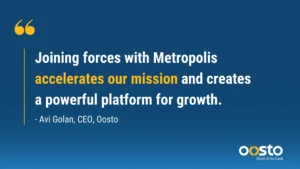Why the Metropolis Acquisition of Oosto Signals a New Era for AI in Facilities and Property Management
When the news broke that Oosto, a leader in AI-driven security and video analytics, was being acquired by Metropolis, a company known for parking automation and frictionless payments, it made waves across the industry. A security-centric AI company joining forces with a parking tech company might seem unexpected at first, but this move represents a much larger trend. Organizations are realizing that breaking down operational silos and adopting more informed, real-time AI tools is the key to smarter, more efficient environments.
For too long, facilities and property management teams have operated in isolation. Security focused on their mission. Operations worked separately. IT managed infrastructure with little integration across departments. This traditional model no longer works. Modern facilities, whether commercial, public, or residential, require seamless collaboration between teams. AI-powered systems are no longer just about solving individual challenges. They are about providing real-time insights based on pre-defined criteria that help entire organizations work smarter together. Which makes the value of this acquisition very clear.
Oosto does not collect data, nor does it create unnecessary complexity. Instead, its AI-driven solutions provide instant insights that meet each customer’s unique needs. By delivering actionable information based on pre-defined rules, Oosto’s solutions help decision-makers across various environments, from hospitals and casinos to transit hubs and corporate campuses, respond proactively to changing conditions. Now, with Metropolis’s reach, these capabilities can be expanded into everyday spaces, creating a more connected and responsive infrastructure.

Avi Golan, Oosto’s CEO, highlighted the power of this partnership in the press release, noting that combining Oosto’s AI expertise with Metropolis’s presence will “amplify our impact, extend our reach, and deliver even greater value to our stakeholders.” This goes beyond simply enhancing security. It is about creating environments where insights flow effortlessly between security, operations, and IT, enabling faster and better-informed decisions that drive efficiency and improve the overall experience.
By moving away from isolated systems and adopting AI-driven solutions that provide targeted insights in real-time, organizations can achieve outcomes that were previously unattainable. Security teams can respond more effectively to events, facilities managers can anticipate operational needs with greater precision, and IT teams can support seamless integration across all systems. The ability to act on real-time insights rather than react to fragmented data sets is what separates forward-thinking organizations from the rest.
This acquisition spotlights a clear shift in the industry. Smarter, more connected environments are not a distant goal. They are becoming a reality today. As businesses continue to embrace AI-powered tools that break down silos and deliver immediate, actionable insights, the future of property and facilities management will be defined by collaboration, efficiency, and smarter operations. The companies that recognize the importance of real-time insights and seamless integration will be the ones leading the way forward.









